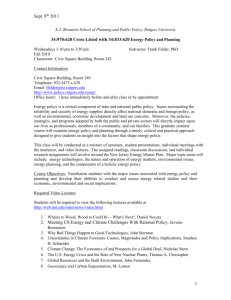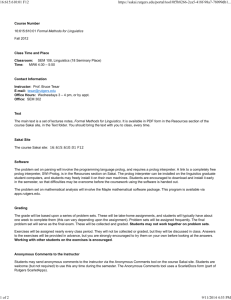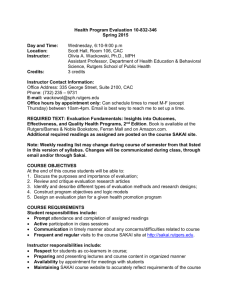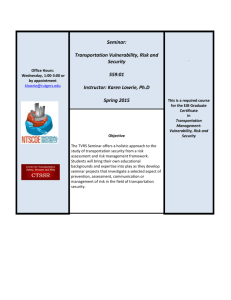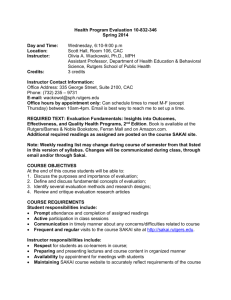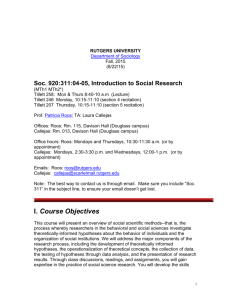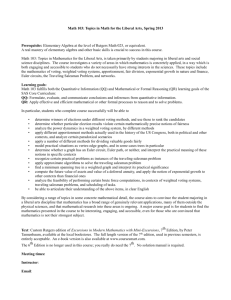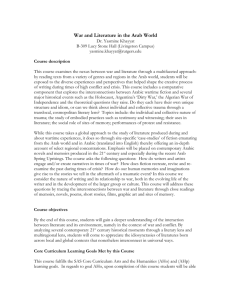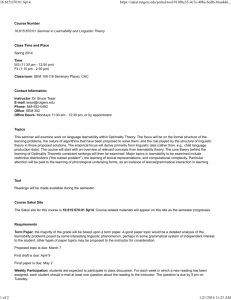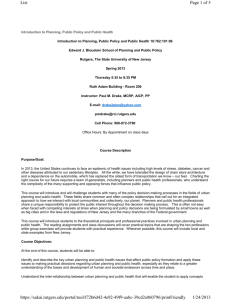The course purpose is to study human behavior in organizations at
advertisement
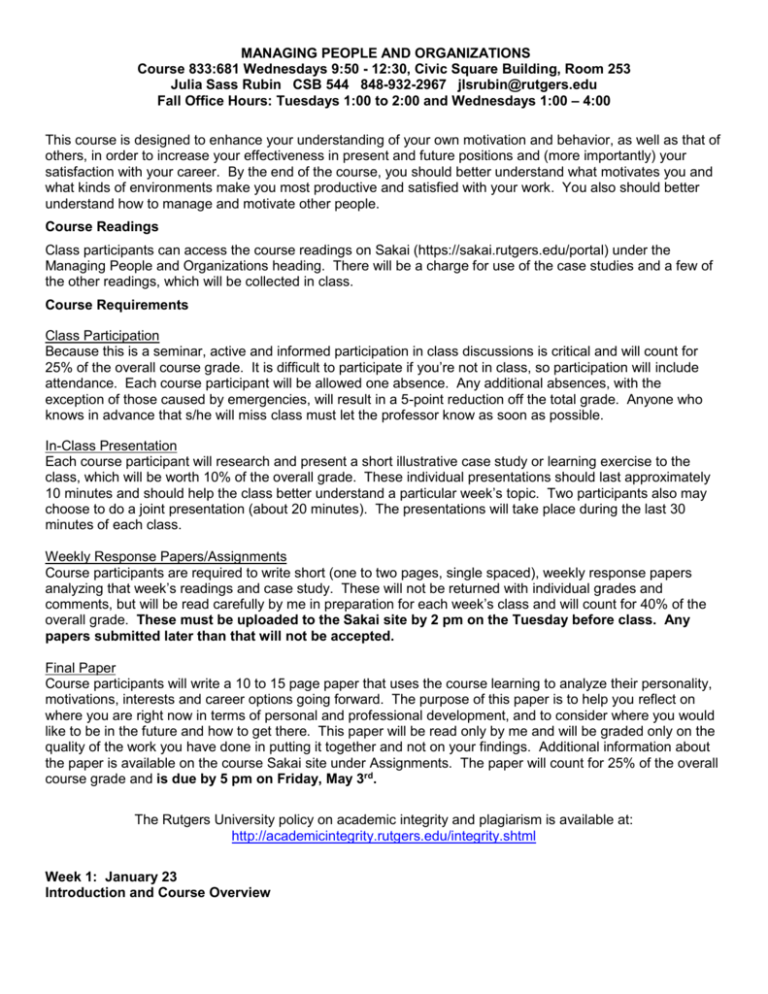
MANAGING PEOPLE AND ORGANIZATIONS Course 833:681 Wednesdays 9:50 - 12:30, Civic Square Building, Room 253 Julia Sass Rubin CSB 544 848-932-2967 jlsrubin@rutgers.edu Fall Office Hours: Tuesdays 1:00 to 2:00 and Wednesdays 1:00 – 4:00 This course is designed to enhance your understanding of your own motivation and behavior, as well as that of others, in order to increase your effectiveness in present and future positions and (more importantly) your satisfaction with your career. By the end of the course, you should better understand what motivates you and what kinds of environments make you most productive and satisfied with your work. You also should better understand how to manage and motivate other people. Course Readings Class participants can access the course readings on Sakai (https://sakai.rutgers.edu/portal) under the Managing People and Organizations heading. There will be a charge for use of the case studies and a few of the other readings, which will be collected in class. Course Requirements Class Participation Because this is a seminar, active and informed participation in class discussions is critical and will count for 25% of the overall course grade. It is difficult to participate if you’re not in class, so participation will include attendance. Each course participant will be allowed one absence. Any additional absences, with the exception of those caused by emergencies, will result in a 5-point reduction off the total grade. Anyone who knows in advance that s/he will miss class must let the professor know as soon as possible. In-Class Presentation Each course participant will research and present a short illustrative case study or learning exercise to the class, which will be worth 10% of the overall grade. These individual presentations should last approximately 10 minutes and should help the class better understand a particular week’s topic. Two participants also may choose to do a joint presentation (about 20 minutes). The presentations will take place during the last 30 minutes of each class. Weekly Response Papers/Assignments Course participants are required to write short (one to two pages, single spaced), weekly response papers analyzing that week’s readings and case study. These will not be returned with individual grades and comments, but will be read carefully by me in preparation for each week’s class and will count for 40% of the overall grade. These must be uploaded to the Sakai site by 2 pm on the Tuesday before class. Any papers submitted later than that will not be accepted. Final Paper Course participants will write a 10 to 15 page paper that uses the course learning to analyze their personality, motivations, interests and career options going forward. The purpose of this paper is to help you reflect on where you are right now in terms of personal and professional development, and to consider where you would like to be in the future and how to get there. This paper will be read only by me and will be graded only on the quality of the work you have done in putting it together and not on your findings. Additional information about the paper is available on the course Sakai site under Assignments. The paper will count for 25% of the overall course grade and is due by 5 pm on Friday, May 3rd. The Rutgers University policy on academic integrity and plagiarism is available at: http://academicintegrity.rutgers.edu/integrity.shtml Week 1: January 23 Introduction and Course Overview 2 Week 2: January 30 Knowing Yourself R. B. Denhardt, J. V. Denhardt and M. P. Aristigueta (2013), Knowing and Managing Yourself, Chapter 2 in Managing Human Behavior in Public & Nonprofit Organizations, pp. 19-36, 40-57. CASE STUDY: Jonah Creighton A Assignment: Do the Lifeline (p. 21-22), Knowing Yourself (p. 22), Increasing Self-Knowledge (p. 35-36), A Vision Statement (p. 36), Personal Values Inventory (p. 40-45), Fundamental Interpersonal Relations Orientation-Behavior Inventory (p. 46 – 50), Locus of Control (p. 51-53), Career Orientation Inventory (p. 5457), and Emotional Intelligence (p. 58) self-assessment exercises in Chapter 2 of Managing Human Behavior. Incorporate your findings into your response paper, which also should analyze the case study. These findings also will be important for your end of semester paper, so take time to do the exercises carefully and fully. Week 3: February 6 - Understanding Others R. P. Vecchio (2003), Personality and Perception, Chapter 2 in Organizational Behavior-Core Concepts, p. 26-43. M R. Banaji, M. H. Bazerman and D. Chugh (2003), How (Un)ethical Are You? Harvard Business Review, 81(12); p. 56-64. J-F. Manzoni and J-L Barsoux (1998), The Set Up To Fail Syndrome, Harvard Business Review, 76(2); p. 101-113. CASE STUDY to be distributed during the February 6th class. Week 4: February 13 - Motivating Yourself and Others F. Herzberg (2003), One More Time: How Do You Motivate Employees, Harvard Business Review, 81(1), p. p87-96. J. Pfeffer (1998), Six Dangerous Myths About Pay, Harvard Business Review, 76(3), p. 109-119. A. Sutherland (2006), What Shamu Taught Me About a Happy Marriage. The New York Times, June 25. Available at: http://www.nytimes.com/2006/06/25/fashion/25love.html CASE STUDY: Ben and Jerry Week 5: February 20 - Leadership Week 6: February 27 - Power and Influence GUEST SPEAKER: Gordon Macinnes, President, New Jersey Policy Perspectives Week 7: March 6 - Understanding an Organization's Culture Week 8: March 13 - Working in Groups and Teams March 20 - Spring Break Week 9: March 27 - Communicating Effectively with Others and Managing Meaning Week 10: April 3 - Managing Conflict Week 11: April 10 - Negotiating Effectively Week 12: April 17 - Fostering Creativity and Innovation Week 13: April 24 - Decision-Making Week 14: May 1 - Organizational Change

